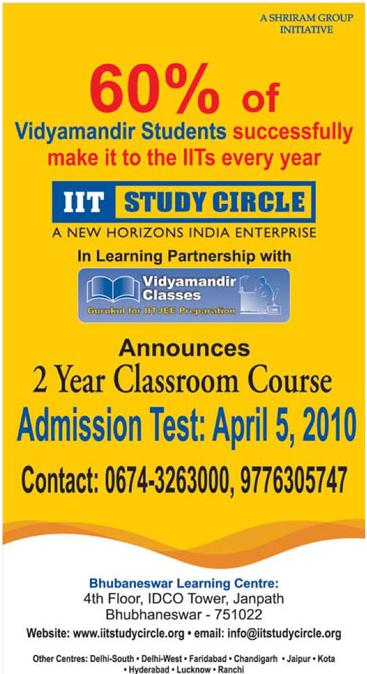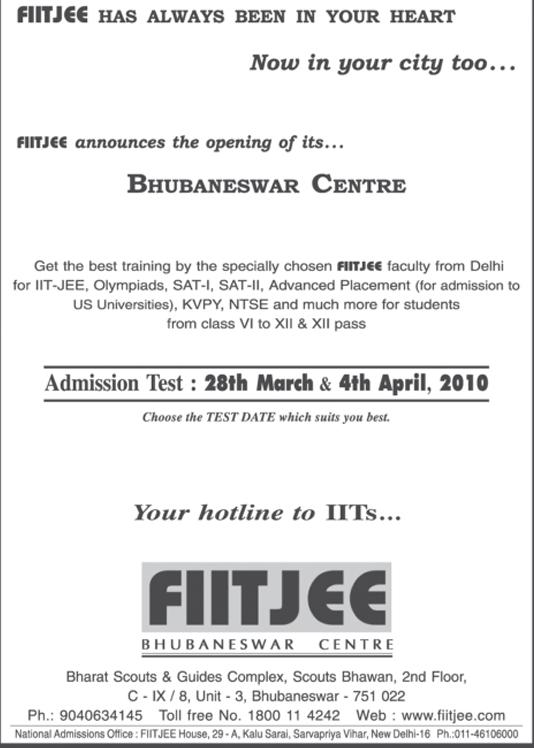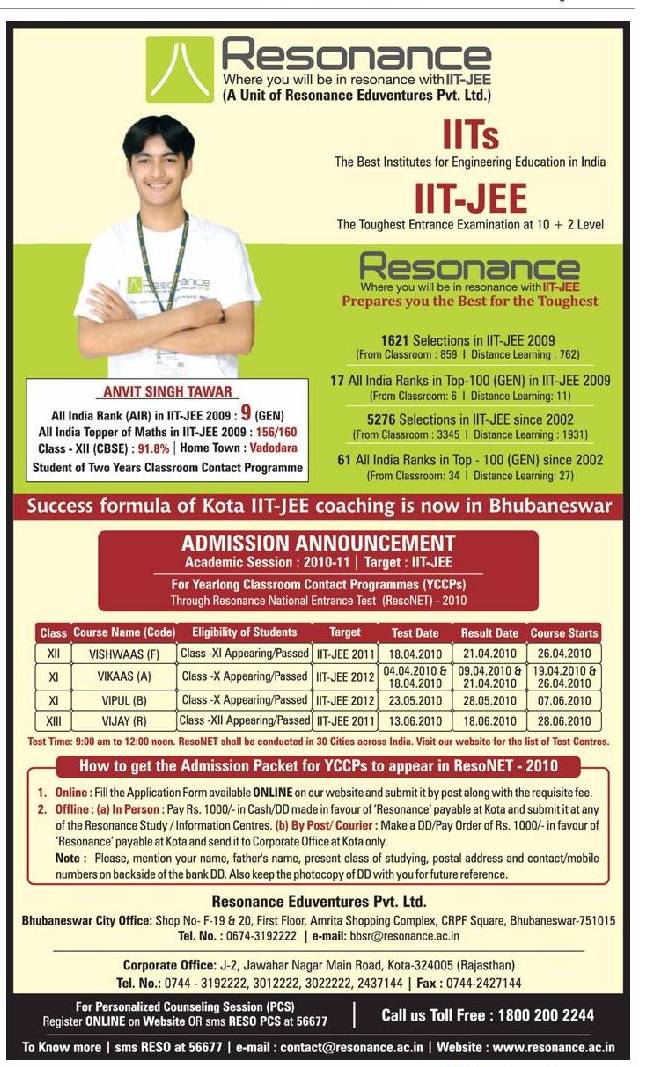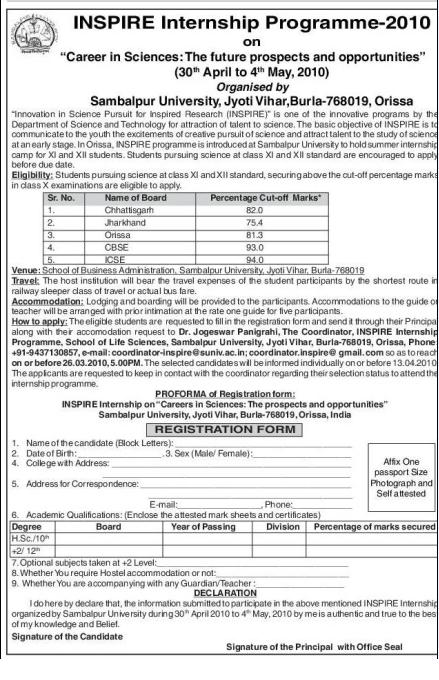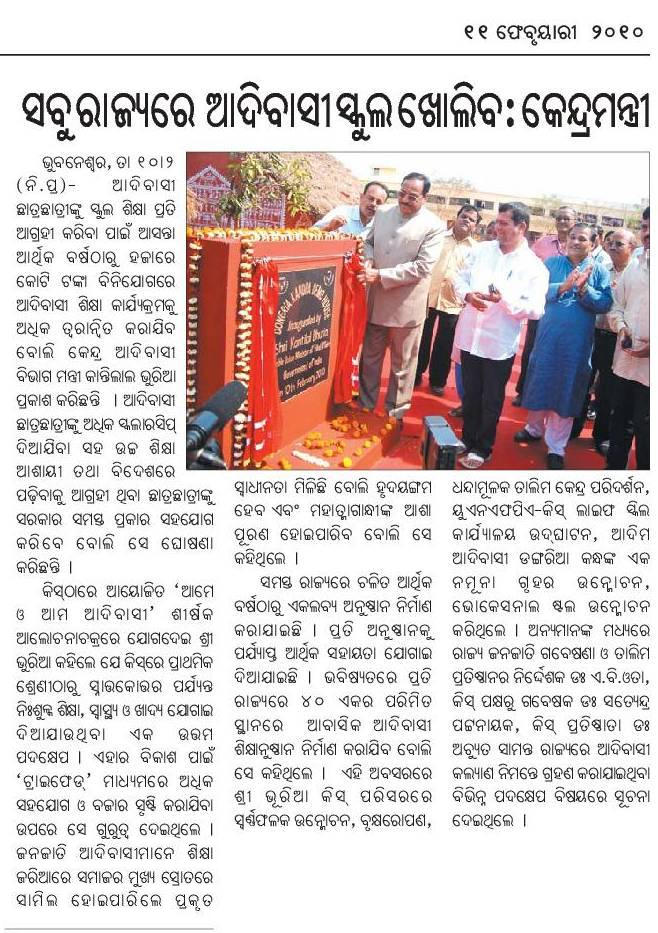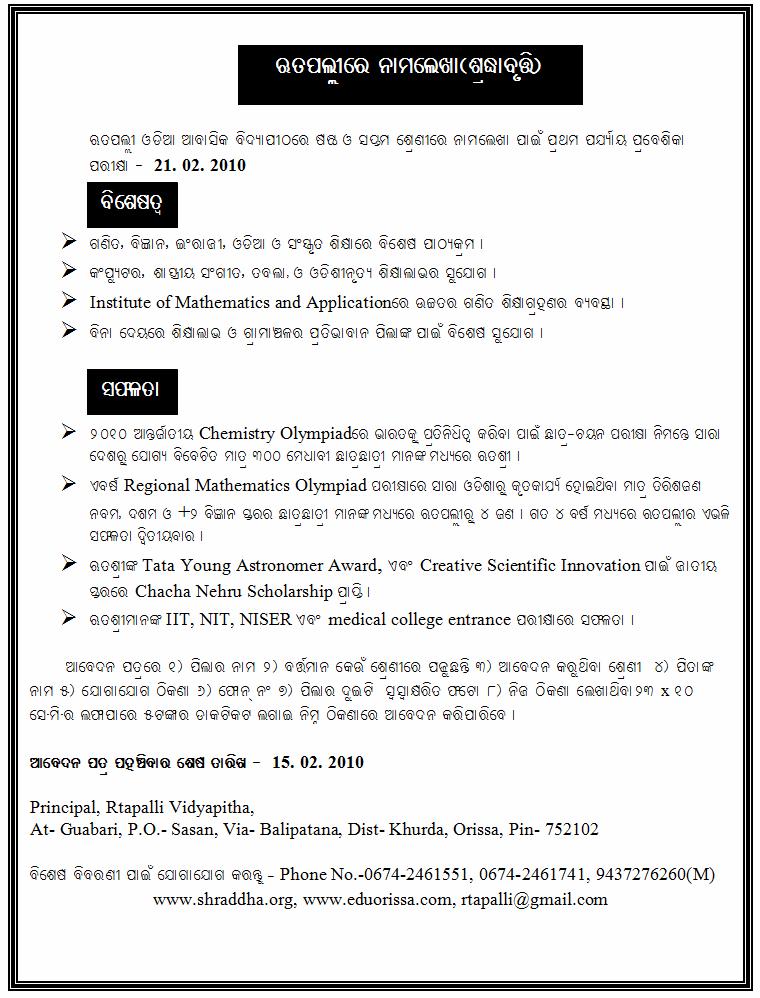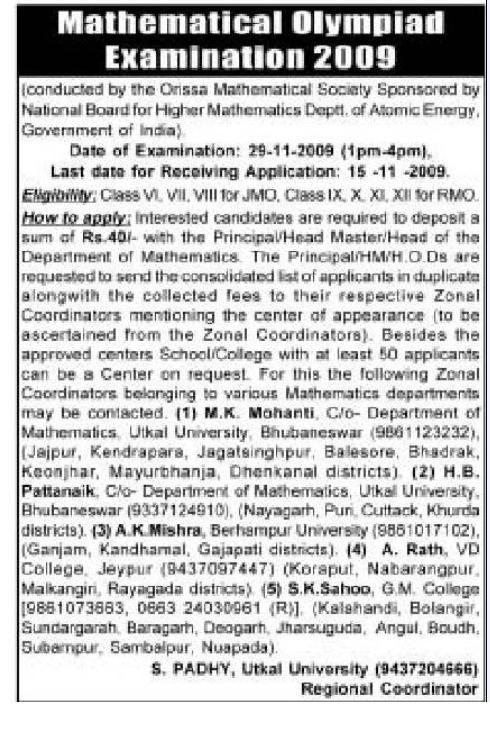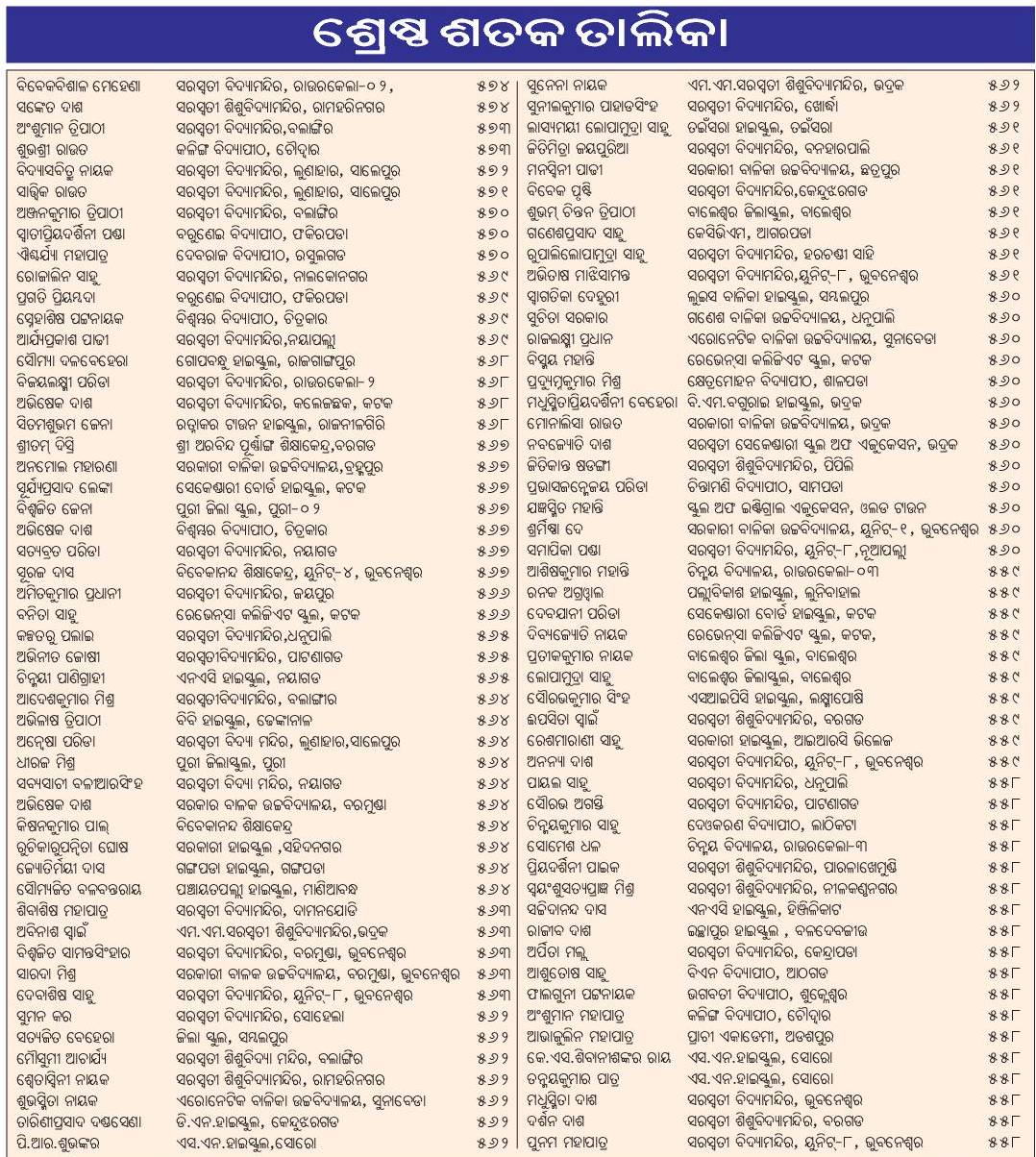Why mention of IIT coaching classes in Orissalinks?
In https://www.orissalinks.com/archives/4059 we mentioned about some of the national tutorials that have now set shop in Bhubaneswar. A close friend and elder of mine (Sandip Dasverma) whom I respect a lot was surprised (and even dismayed) that I gave space to them here, and was wondering how come I am promoting institutes that to him are so harmful to our society.
I have mixed thoughts and feelings about the whole thing, so I decided I will write my thoughts and feelings, which at this point may not be fully coherent.
1. In Orissalinks we are writing about *all* kinds of educational and HRD infrastructure and opportunities in Odisha. When we write about ITI or Diploma or vocational schools we are not necessarily promoting them; nor it is our intention that every body should do ITI or a diploma. (On the other hand we do not think there is anything wrong in going to an ITI or doing a Diploma.) We cover them so that these pages serve as a dynamic directory of opportunities and infrastructure of various kinds. In that sense IIT tutorials are educational and HRD infrastructure elements and we cover them. Our coverage does not necessarily mean we promote them. In case of ITI and Diploma institutions, having them listed here helps industries who may be considering to move to Odisha.
2. To us IIT tutorials are HRD infrastructure elements that for whatever reason are an important component of a city/town/metro/population-hub. Students are looking for them, the parents are looking for them, the top ones at other locations have been successful in sending large numbers to the IITs, and parents in Odisha due to the lack of such institutes have sent their kids out of state. Moreover, Odisha has been sending comparatively very few students to IITs, thus not taking advantage of the opportunity provided by the well-funded and reputed IITs. So in that sense having top national coaching classes in Odisha is good. The kids who want to go there need not now go to or be sent to (by their parents) locations out of state and hopefully there will be more number of people getting to IITs from Odisha because of the presence of these nationally reputed tutorials in Odisha.
Hopefully we have clarified why we covered IIT tutorials here; We covered them because as the situation in India is now, they are an important educational infrastructure of a place/town/city/metro.
Thats that, but what do we think about these tutorials and their alleged harmful impact on the education system and society. To us the issue is not so simple nor black and white. To initiate a debate we will put some pointers and arguments.
- Coaching classes in various countries and their purpose is given here. In India, coaching classes are a reality and they thrive because (i) admission to top schools is extremely competitive and (ii) the admission process is fairly well defined. In this regard one may read the article at http://hosted.law.wisc.edu/wilj/issues/24/1/steiner.pdf which explains why cram schools for getting law license is common in many other countries but not in the USA.
- Coaching classes are not so common for college admission in the USA because of two main reasons: Decent students can fairly easily get into decent universities in most states; and admission is not based on a single exam and the process is not very clear and on purpose not well explained to the public.
- At this point the fuzzy processes adopted for admissions in US institutions will not work in India as there will be a lot of chance for corruption. One of the aura behind the IIT entrance exams and its admission process is the lack of corruption in the process of IIT admission. Many a professors and IIT directors’ kids have not been able to get into IITs. That is not the case in most US universities (even the most elite and most competitive ones) where kids of alumni, faculty and big donors may have an inside track to admission.
- Recently a committee chaired by Prof Damodar Acharya has been formed to revamp the IIT admission process. Among other things they are considering to take into account the marks obtained in the 12th grade. I am not sure if that will eliminate the coaching classes. The coaching classes will just adopt and start teaching how to also ace the 12th exam.
- However it is the case that mastering (how to answer) the kind of questions asked in the IIT entrance exam requires coaching beyond what is taught in the regular school curriculum. If the question pattern was changed to closely follow the regular school curriculum then coaching classes will possibly be less effective and thus their attraction could possibly decrease. But the questions may then be too simple making it difficult to pick 10,000 out of 5 lakhs. Also, there is a reason behind the kind of hard questions that are asked in the IIT entrance exams. Students with aptitude to answer such questions are good at problem solving and thus the kind of students the IITs are looking for. But IITs have not been able to figure out how to separate these students from students who have trained (and been coached) to be successful in the IIT entrance exams.
- It is common in India to believe in the notion of "inherent ability" which is behind the elusive goal of finding students who have the inherent ability versus students who apparently do not have that ability but train hard (in the coaching classes) and get through the entrance exams.
- But this view is being challenged. See the book review at http://www.nytimes.com/2010/03/21/books/review/Paul-t.html?ref=books. Following is a quote: "David Shenk with “The Genius in All of Us,” which argues that we have before us not a “talent scarcity” but a “latent talent abundance.” Our problem “isn’t our inadequate genetic assets,” but “our inability, so far, to tap into what we already have.” The truth is “that few of us know our true limits, that the vast majority of us have not even come close to tapping what scientists call our ‘unactualized potential.’ ” At first it would seem that Shenk, the author of thoughtful books on information overload, memory loss and chess, has veered into guru territory. But he has assembled a large body of research to back up his claims. … Shenk doesn’t neglect the take-home point we’re all waiting for, even titling a chapter “How to Be a Genius (or Merely Great).” The answer has less in common with the bromides of motivational speakers than with the old saw about how to get to Carnegie Hall: practice, practice, practice. Whatever you wish to do well, Shenk writes, you must do over and over again, in a manner involving, as Ericsson put it, “repeated attempts to reach beyond one’s current level,” which results in “frequent failures.” This is known as “deliberate practice,” and over time it can actually produce changes in the brain, making new heights of achievement possible.
- In light of the above, is it really right to look down on students who worked hard for whatever number of years in a coaching class and trained themselves so as to succeed in the IIT entrance exam? Can we really fault the coaching classes who provide the students the opportunity to train, train and train? Who are we to tell that train, train, train following a goal or someone’s life’s ambition is bad? Do we do that with respect to an athlete or an aspiring musician? No, we are impressed by their dedication.
- Few years back IITs changed their requirement for admission and now one can enter an IIT only the year he/she passes the 12th or the next year. This was aimed at stopping people from spending multiple years in coaching schools in preparation for IIT. I guess it addresses that problem but raises other questions such as: Why is it wrong to work hard and long and prepare? Why can not some one decide to pursue an engineering degree at whatever age they become interested in? The later is a problem in most programs in India and is understandable because of the resource crunch. Coming back to the former: Why is it wrong to work hard and long and prepare? Does the society penalise an athlete or a music student who decides to fully focus on their goal of being a world class athlete or a musician? In case of the IITs, the problem is that most students who work hard and long to get in, do not often work hard once they get into the IITs. But then the IITs should design their course work accordingly? Also, they should assign majors for most students (say 80%) after the first year. That way students after they get in will have to work hard to get the major of their choice.
- Who are bad? The students going to coaching classes? Their parents? The owner of the coaching class? The faculty at the coaching classes? The System? If it is the system then as we mentioned we can not fault the nature of the admission process as a non-transperent one (used in the US universities) will not work in today’s India where corruption is endemic and because of that even national tests are conducted for clerical jobs in the Railways and Banks. So the only approach is to have enough good institutions/colleges/universities so that the situation is not as competitive as it is now. But even then there will be coveted institutions and admissions to them will be extremely competitive and their will be coaching classes for them. Just look at France, where 5% of its high school graduates spend 2-3 years in cram schools so that they can get into the Grandes Ecoles.
- The increase in the number of IITs, NITs, central universities, the creation of new IIITs, IISERs/NISER and the plan for 14 innovation universities will increase the number of good institutions in India and that would be helpful. They will also help in the more serious issue that plagued India where most good students out of high school went for engineering and medicine.
- However, India needs to figure out how to improve the standards at its state universities and colleges which have degraded badly over the years. Just creating new creamy layers on the top and letting the bottom rot will worsen the situation.
I hope the above thoughts explain why I don’t agree with the crowd and follow the fashion these days among many who put all the blame in the world at the door of coaching classes. I can see some adverse results (such as the story about an IIT JEE number 1 who was coached three years before he got JEE 1 but flunked in many of his classes in the first year) but it is not easy for me to just point blank think coaching classes as evils. In fact there may be evidence to the contrary. The coaching classes seems to have helped students from far flung areas without access to good schools to get trained and get into the IITs. The success of the super 30 in Bihar has now prompted the Punjab government to start similar coaching for rural students in Punjab. Similar plans are also afoot in Tamil Nadu and Chhatisgarh. The Orissa government had also announced similar plans in collaboration with the Institute of Mathematics & Applications. I am not sure if that has been implemented.
Now some other related thoughts.
- In my school days, middle class parents would find a tuition master or send their kids for tution if the kids were not doing well in school. So being "tutored" had a negative connotation similar to the connotation of "remedial classes" in US schools. Of course in US now parents and kids are being sensitized to not look down on students with reading and learning disabilities. But things started changing in India and students doing well also started getting tutored to do even better, and at times this was encouraged by the teachers themselves, some with motivation to augment their income (their pay was always pathetic). Some of these teachers neglected in their teaching in their regular classes giving bad names to the "tutors". These two underlined aspects have contributed to the negative connotation behind coaching in the mind of many.
- Personally, I have never had a tuition master in my life. I did take postal coaching (Agrawal Classes) in my 12th class (ISc 2nd year) to prepare for IIT and got in that year. The postal coaching worked as follows: I would get booklets with some theory and solved examples and some questions. I would solve the questions myself and send it for evaluation. Some one (a faculty) at the coaching center would evaluate my solutions and give me a grade. Thats all. This was better than the alternative of reading the IIT entrance guide books and doing the exercises there as in case of the later, one was not sure if the solution was correct or not. Also, in case of the postal coaching, the solutions had to be sent in within certain time, thus creating a discipline on the preparation. I have not met a single person in my life who got through the IIT entrance exam without preparing specifically for IIT outside of the class syllabus and that meant at least going through the IIT entrance guide books.
- So I have no direct idea about how the current classroom coaching classes operate. I only know from second and third hand descriptions.
Having said all this, what would be my advice to students in their 11th and 12th grade?
- First, one need not focus on IITs, engineering or medicine. India now provides successful careers in many many fields. One can go for science and math in the top institutes such as IIISERs, NISER, ISI, etc. One can go for law in one of the National Law Schools. One can go for Economics and other social science subjects in various good colleges. One can go for accountancy and other commerce subjects. One can be successful in any of those. Also, down the road the IISERs, NISER, National Law schools and the Innovation Universities will have similar name recognition as the IITs.
- However, if one aims to get into the IITs, until further changes happen one still need to prepare beyond their Class 12 syllabus. Here I would recommend the aspiring students to get into the best coaching class (in terms of their past performance) that is available. In that regard it is good that Bhubaneswar now has some of the nationally known top ones in FITJEE, Vidya Mandir and Resonance. However, in case the teachers in those coaching classes do not emphasize the following, I would have one advice to the students: There is no substitute to the ability and understanding one develops when one is pondering on a question (on his/her own) for hours or sometimes days and is eventually able to figure out how to solve it. Memorizing a trick told by the teacher to solve that question is an extremely poor substitute and does not develop the critical thinking ability that the IITs expect their students to have. On the positive side, the periodic exams conducted by the coaching classes have some advantages. Doing well in them and getting encouragement from the teachers who are able to compare a current coaching class student with successful students from yesteryears gives the students the much needed confidence. (In general I have noticed that less students from Odisha get into IITs because of the confidence problem during their 11-12th. But where ever the good ones go, they do well and become very successful in their careers.) Also, the coaching classes provide a routine and a discipline in the preparation. This is hard for a 16-17yr old to do on his/her own.
- In this regard one may note that bad coaching classes or not using the coaching classes in the right way could be very harmful. As an anecdotal example, a nephew of mine was telling me that he was not confident about his IIT exam as he did not have a tuition master in subject X, though he had tuition in Y and Z. After the IIT entrance exam he said he did well in X but not in Y, Z. I explained him and he agreed that in X, he studied himself and developed the understanding while in Y and Z, he was told various problem solving tricks; but that did not develop a deeper understanding in his mind and he could not apply them to the questions he encountered in the IIT entrance exam.
8 comments April 3rd, 2010
